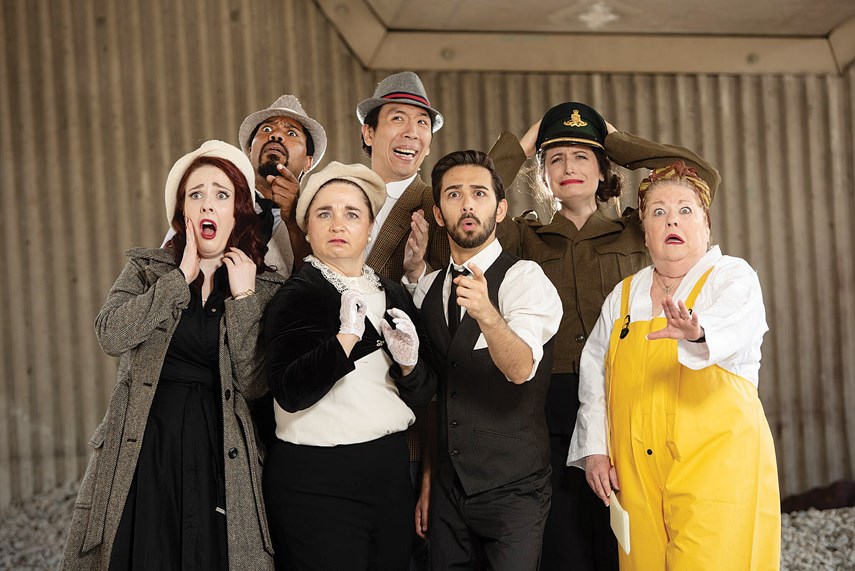Dyck Spacee: A Spy-Fi Improvised Radio Play, The Improv Centre, 1502 Duranleau, Granville Island, until Sept. 15. For more details visit .
It wasnŌĆÖt until she left England that Holly Dalston lost the script.
Inspired by nimble-tongued thespians who populate British films, the Handsworth Secondary grad packed her bags to study classic theatre in London.
ŌĆ£I just fell in love with it,ŌĆØ she says.
She decried barren rascals in Twelfth Night and demanded: ŌĆ£Where learned you that oath, fool?ŌĆØ in As You Like It.
But both good times and travel visas run out eventually, and Dalston eventually returned to North ┬ķČ╣┤½├Įė│╗Łwhere she began to study a theatre style sheŌĆÖd so far neglected: improv.
An extremely shy child, Dalston recalls being hesitant to take the stage in school.
ŌĆ£I was really intimidated by all the drama kids but I always had the kind of creative spark,ŌĆØ she says.
For a reluctant performer, classical theatre makes sense. The stories are established, the character motivations are clear, and the dialogue is sometimes treated as reverentially if it were chiseled in stone.
But improv offered Dalston something else. Instead of certainties there were possibilities. Instead of plot and structure and character there was guess and guts and gamble.
And instead of a great voice, improvisers needed faultless hearing, she learned.
ŌĆ£The art of improv is just going with the flow,ŌĆØ Dalston says, discussing her time at VancouverŌĆÖs Improv Comedy Institute.
Her skill caught the attention of improvisers Rachelle Lachland Goulter and Debra Sears, who asked her to audition for their new production: Dyck Spacee: A Spy-Fi Improvised Radio Play.
The tryout was one hour of character work and a series of improv games, Dalston says. While some auditions can be terrifying, this one was exhilarating.
ŌĆ£I left going: ŌĆśOh my god that was so much fun!ŌĆÖŌĆØ
She got the part, giving her a chance to participate in a play within a play centred around a live radio show that harkens back to the days when families gathered around the radio to hear the latest exploits of The Lone Ranger and Captain Midnight.
ŌĆ£We stand up there with our microphones and we make it all up,ŌĆØ she promises.
The performance is a light-hearted take on the film noir movies that usually consisted of dirty towns and filthy minds.
Film noir was largely a collision of German expressionism with the hardboiled stories of lust, murder and guilt mastered by James M. Cain.
But the end of the Second World War loosed a new strain in the genre. The crooks were still cheap and their patter was still gaudy, but in the postwar years personal corruption became increasingly associated with global catastrophe. In Double Indemnity (1944), Fred MacMurray plays Neff, an insurance salesman who sees his ruin in Barbara StanwyckŌĆÖs eyes. Just two years later, Orson Welles made The Stranger, and suddenly there was no need for a femme fataleŌĆÖs corrupting charms. As a Nazi in hiding, WellesŌĆÖs protagonist was already corrupt to his core.
A few film noir pictures hint at the potential for apocalypse, but the starkest vision of a black and white mushroom cloud is offered in 1955ŌĆÖs Kiss Me Deadly, a detective story that starts with a murdered woman and ends with a warning about atomic extinction.
ŌĆ£IŌĆÖm going to pronounce a few words,ŌĆØ a cop intones in the bleak flick. ŌĆ£TheyŌĆÖre harmless words. Just a bunch of letters scrambled together. But their meaning is very important . . . . Manhattan Project, Los Alamos, Trinity.ŌĆØ
Decidedly more lighthearted than its source material, Dyck Spacee aims to combine film noir conventions with science fiction. Picture a Martian in a fedora and youŌĆÖre closer than youŌĆÖd expect.
The cast has pored over a lot of the old movies, noting tropes and laughing at things ŌĆ£you could never get away withŌĆØ these days, Dalston says.
To make the experience authentic to old time radio plays, the cast will also provide sound effects, snapping chopsticks for broken bones and slapping a football for punches, Dalston reports.
Asked why theatregoers should make time to see the show, Dalston points out that they donŌĆÖt have to make very much time.
ŌĆ£ItŌĆÖs only 45 minutes,ŌĆØ she laughs. ŌĆ£ItŌĆÖs not two hours of your life.ŌĆØ
The other appeal, naturally, is spontaneity.
ThereŌĆÖs no script. Instead, thereŌĆÖs a plan to combine the elements of the set, actors and audience suggestions: ŌĆ£and just see where the story takes us that night.ŌĆØ
Set for 10 performances, the production is set to debut Sept. 6.
╠²


